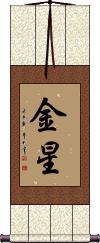Many custom options...
And formats...

Venus Gold Star in Chinese / Japanese...
Buy a Venus Gold Star calligraphy wall scroll here!
Venus / Gold Star
金星 literally means gold star. Most of the time, in the context of the sky, this refers to the planet Venus.
Away from the sky, this can refer to a dazzling victory (e.g. win of a rank-and-file wrestler over the grand champion) or be the Japanese surname Kinboshi.
In the Buddhist context, this is Śukra, from Sanskrit for the planet Venus.
This in-stock artwork might be what you are looking for, and ships right away...
Beautiful Blue and Gold Chinese Birds & Flowers Painting
Discounted Blemished
Gallery Price: $71.00
Your Price: $39.00
Gallery Price: $101.00
Your Price: $55.88
Gallery Price: $63.00
Your Price: $34.88
Gallery Price: $63.00
Your Price: $34.88
Gallery Price: $72.00
Your Price: $39.88
Gallery Price: $63.00
Your Price: $34.88
Gallery Price: $72.00
Your Price: $39.88
Gallery Price: $50.00
Your Price: $29.88
Gallery Price: $101.00
Your Price: $55.88
Gallery Price: $72.00
Your Price: $39.88
Gallery Price: $101.00
Your Price: $55.88
Gallery Price: $101.00
Your Price: $55.88
Gallery Price: $101.00
Your Price: $55.88
Gallery Price: $101.00
Your Price: $55.88
Not the results for venus gold star that you were looking for?
Below are some entries from our dictionary that may match your venus gold star search...
| Characters If shown, 2nd row is Simp. Chinese |
Pronunciation Romanization |
Simple Dictionary Definition |
金星 see styles |
jīn xīng jin1 xing1 chin hsing kinboshi きんぼし |
More info & calligraphy: Venus / Gold Star(1) dazzling victory; (2) {sumo} win of a rank-and-file wrestler over the grand champion; (surname) Kinboshi Śukra, the planet Venus. |
The following table may be helpful for those studying Chinese or Japanese...
| Title | Characters | Romaji (Romanized Japanese) | Various forms of Romanized Chinese | |
| Venus Gold Star | 金星 | kinboshi / kinsei | jīn xīng / jin1 xing1 / jin xing / jinxing | chin hsing / chinhsing |
Successful Chinese Character and Japanese Kanji calligraphy searches within the last few hours...



















